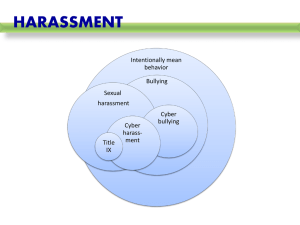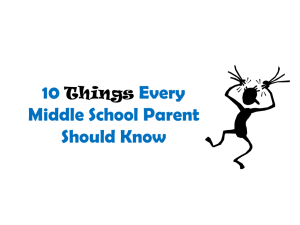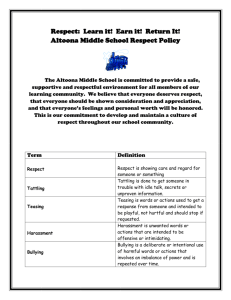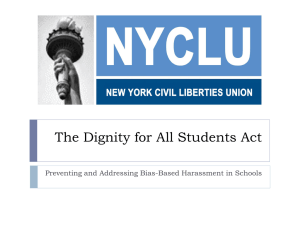Anti-bullying and Harassment Policy
advertisement
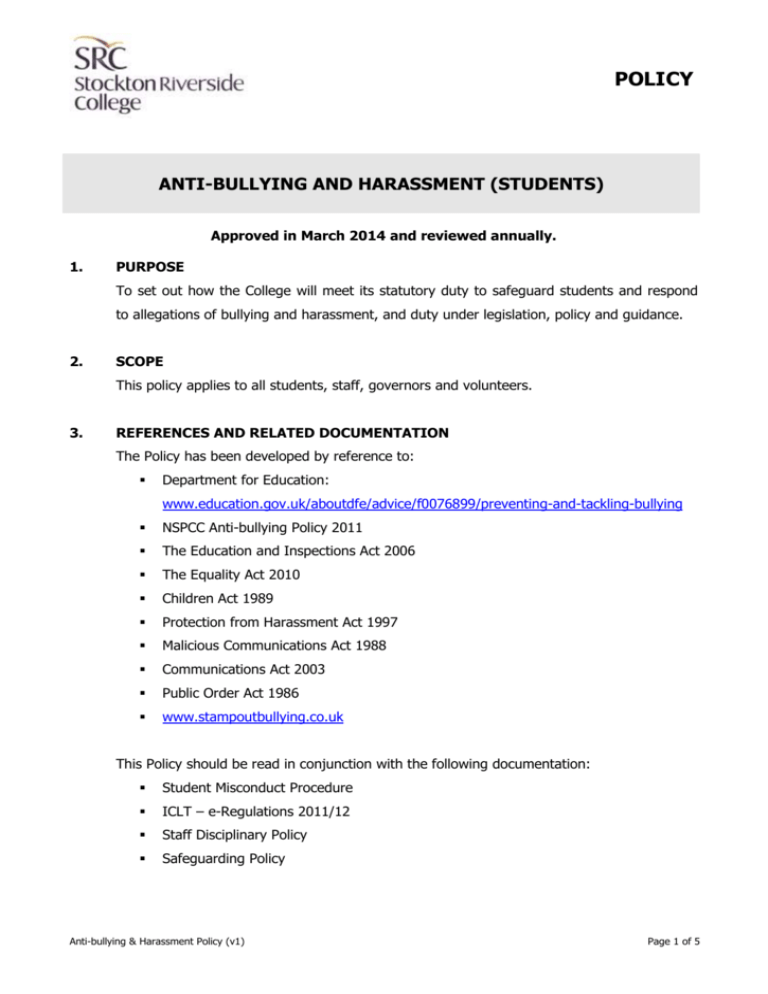
POLICY ANTI-BULLYING AND HARASSMENT (STUDENTS) Approved in March 2014 and reviewed annually. 1. PURPOSE To set out how the College will meet its statutory duty to safeguard students and respond to allegations of bullying and harassment, and duty under legislation, policy and guidance. 2. SCOPE This policy applies to all students, staff, governors and volunteers. 3. REFERENCES AND RELATED DOCUMENTATION The Policy has been developed by reference to: Department for Education: www.education.gov.uk/aboutdfe/advice/f0076899/preventing-and-tackling-bullying NSPCC Anti-bullying Policy 2011 The Education and Inspections Act 2006 The Equality Act 2010 Children Act 1989 Protection from Harassment Act 1997 Malicious Communications Act 1988 Communications Act 2003 Public Order Act 1986 www.stampoutbullying.co.uk This Policy should be read in conjunction with the following documentation: Student Misconduct Procedure ICLT – e-Regulations 2011/12 Staff Disciplinary Policy Safeguarding Policy Anti-bullying & Harassment Policy (v1) Page 1 of 5 4. DEFINITIONS ‘Bullying is behaviour by an individual or group, repeated over time, that intentionally hurts another individual or group either physically or emotionally’ (DfE). Bullying is any repeated words or actions, which are aimed at causing someone to feel frightened, miserable and helpless at College. There are many definitions of bullying, but most people consider it to be: deliberately hurtful repeated over a period of time difficult for people to defend themselves against Bullying can take many forms, for example: Verbal – name calling, sarcasm, threatening, teasing Physical – pushing, hitting, kicking, punching or any use of physical aggressive contact Social – ignoring, spreading rumours, treating someone like an outsider Psychological/Mental – stalking, intimidation Cyber – chat rooms, online, instant messaging – email, mobile phone Bullying is often motivated by prejudice or ignorance for example on the grounds of appearance, race, religion, nationality, gender, sexual orientation, jealousy. Those from minority ethnic groups, with disabilities, gay, lesbian or transgender (LGBT) or those with learning difficulties can be more vulnerable to this form of abuse and may well be targeted. Harassment is any conduct which is unwanted by a recipient, which affects the dignity of an individual or group of individuals in the College. Harassment may be repetitive or an isolated occurrence against one or more individuals. The Equality Act 2010 specifies protected characteristics which include age, disability, gender reassignment, race, religion or belief, sex, sexual orientation, marriage & civil partnership, pregnancy & maternity. 5. STATEMENT OF ACTION Stockton Riverside College will investigate and respond with appropriate action to all known instances of bullying and harassment. Students are expected to treat each other and staff Anti-bullying & Harassment Policy (v1) Page 2 of 5 with respect and courtesy at all times. Bullying, including cyber bullying and harassment, are categorised as gross misconduct and carry the most severe sanction. All allegations/incidents will trigger an investigation which could lead to disciplinary processes in line with College misconduct procedures. Sanctions may include suspension whilst an investigation takes place and permanent exclusion. The individual may choose to take legal action with College support if appropriate. All students, staff and other stakeholders have the responsibility to work together to ensure that bullying and harassment does not occur, or where it is found, action is taken. All staff are responsible for implementing the College Safeguarding Policy. It is mandatory that all staff attend an annual safeguarding update to ensure they are aware of steps to take in the event of problems relating to child protection and safeguarding. Advice and information in relation to bullying and harassment will be available from appropriate staff and volunteers. Students will be made aware of bullying, including cyber bullying harassment and safeguarding as part of tutorial. Staff receiving reports of bullying must take appropriate action and ensure the report is investigated, and the student misconduct procedure followed. 5.1 Safeguarding the individual We will respect each other’s need for and rights to, a learning environment where safety, security, praise, recognition and opportunity for taking responsibility are available. We will respect every individual’s feelings and views. We will recognise that everyone is important and that our differences make each of us special. We will show appreciation of others by acknowledging individual qualities, contributions and progress. We will ensure safety by having anti-bullying rules and practices, developed with the participation of students, carefully explained and displayed for all to see. 5.2 Support for students Students can talk to their personal tutor, a youth worker, or another member of College staff about any concerns they have about bullying or harassment. This information is promoted around the College. Anti-bullying & Harassment Policy (v1) Page 3 of 5 Systems are in place to encourage students who wish to talk about bullying, harassment or any other issue that affects them. The well-being team and personal tutors are available and accessible. Helpline numbers are displayed in the student common room, at the end of this Policy and are also provided at various times of the year in the student ‘Grapevine’. Anyone who reports an allegation/incident of bullying or harassment will be listened to carefully and be supported. This support will be available to all involved throughout the investigation process. However, this is not a replacement for the College misconduct procedure which will be followed at all times. Allegations/incidents will be recorded and students will be told what is being recorded, in what context and why. 5.3 Support for Parents/Carers Parents/carers have access to this policy and practice about bullying via the College website. Any incident of bullying will be discussed with the student’s parents/carers where appropriate and agreements made as to what action should be taken subject to compliance with the College misconduct procedure. Support will be offered to the parents/carers, including where to obtain information from other agencies or support lines. Information and advice on coping with bullying will be given to all involved. 5.5 Useful Contacts NSPCC Helpline 0808 800 5000 ChildLine 0800 500 / www.childline.org.uk Kidscape www.kidscape.org.uk Anti-Bullying Alliance www.antibullyingalliance.org Bullying UK www.bullyinguk.org.uk Anti-bullying & Harassment Policy (v1) Page 4 of 5 Students have been consulted on the development of the Policy and have named the aspects most important to them, which have been included in this policy. Students will be encouraged and supported to take a role in stopping bullying in their community. This Policy will be reviewed regularly in the light of changing needs and changes adopted by other agencies. Anti-bullying & Harassment Policy (v1) Page 5 of 5



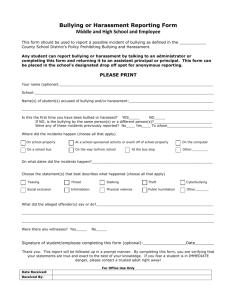
![Bullying and Harassment Advisor role des[...]](http://s3.studylib.net/store/data/006976953_1-320eb77689e1209d082c9ec2464350ee-300x300.png)
